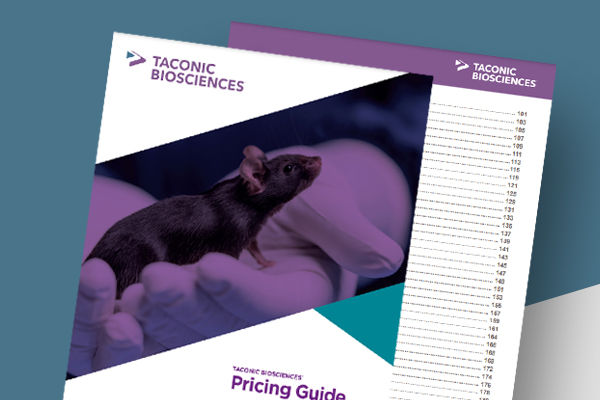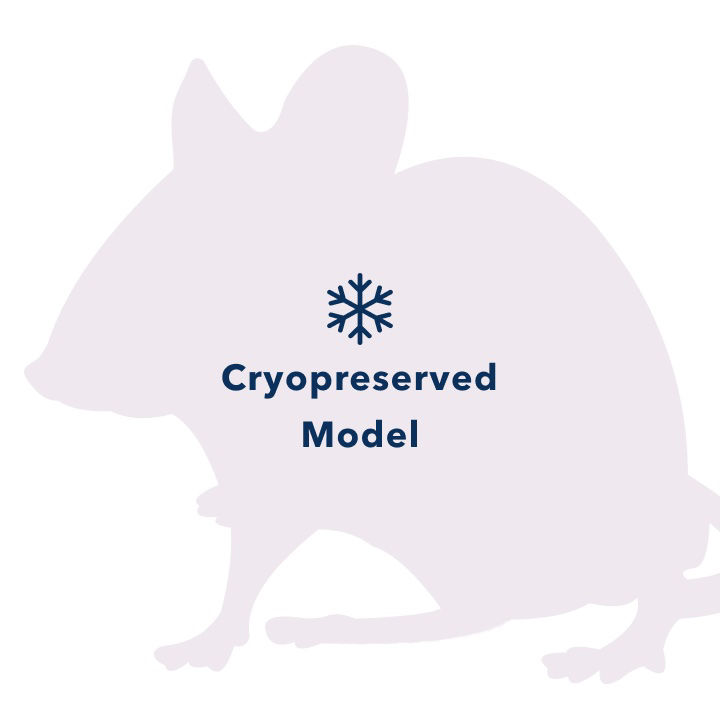| Model No. | Nomenclature | Genotype |
|---|---|---|
| 4149-F | B6.129S2-H2-Ab1tm1Gru Tg(HLA-DRA/H2-Ea,HLA-DRB1*0401/H2-Eb)1Kito | ko/ko;tg/tg |
| 4149-M | B6.129S2-H2-Ab1tm1Gru Tg(HLA-DRA/H2-Ea,HLA-DRB1*0401/H2-Eb)1Kito | ko/ko;tg/tg |
Abb Knockout/Transgenic HLA-DR4

- Description
- Price & Licensing
- Health Report
- Overview
- Genetics
- Guides & Publications
- Applications & Therapeutic Areas
- Transit, Housing & Welfare
- Diet
Overview
Nomenclature: B6.129S2-H2-Ab1tm1Gru Tg(HLA-DRA/H2-Ea,HLA-DRB1*0401/H2-Eb)1Kito
The HLA-DR4 allele is associated with the development of autoimmune diseases such as rheumatoid arthritis and multiple sclerosis. In an attempt to provide a mouse model for these diseases, a hybrid MHC class II molecule between the peptide binding domains of human HLA-DRA and HLA-DRB*0401 and the membrane proximal domains of mouse I-E (H2-E) was engineered and co-injected into C57BL/6 fertilized eggs. The transgenic offspring were bred to a mouse incapable of expressing other MHC class II molecules (Abb knockout on B6 background). By preserving the alpha 2 and beta 2 domains of mouse MHC class II, interactions with CD4 co-receptors on T cells was preserved. This mouse is healthy and breeds normally. Immunization with a peptide from a proteolipid protein known to bind to HLA-DR4, provoked a strong T cell proliferative response, caused inflammatory lesions in CNS white matter, and symptoms of experimental allergic encephalomyelitis (EAE).
Orders by weight: Taconic cannot accept orders by weight for this model. Please note that shipments may contain animals with a larger weight variation.
Origin
Genetics
Guides & Publications
Initial Publication:
- Ito K, Bian HJ, Molina M, Han J, Magram J, Saar E, Belunis C, Bolin DR, Arceo R, Campbell R, Falcioni F, Vidovic D, Hammer J, Nagy ZA: HLA-DR4-IE chimeric class II transgenic, murine class II-deficient mice are susceptible to experimental allergic encephalomyelitis. J Exp Med 1996 Jun 1;183(6):2635-44.
- Grusby MJ, Johnson RS, Papaioannou VE, Glimcher LH. (1991) Depletion of CD4+ T-Cells in Major Histocompatibility Complex Class II - Deficient Mice. Science, 253(5026):1417-1420.
Applications & Therapeutic Areas
- Autoimmune Disease
- Genetically Humanized
- Immunology
- Infectious Disease
- Inflammation
- Microbiome
- Oncology & Immuno-Oncology
- Vaccine Research
Transit, Housing & Welfare
Need more info? Click the live chat button or Contact Us
Packing Practices
Taconic standard practice is to recombine animals of different home cages and/or ages from a single model and sex during packing, except in specific cases where Taconic's animal welfare policy prohibits recombination due to aggression or other concerns. When an order is fulfilled with animals from more than one week of birth, this standard practice results in animals from a range of birth weeks packed together in a single TTC. When an order is fulfilled with animals from genotyped models, this standard practice results in animals from different home cages packed together in a single TTC.
Customers who wish to keep animals from different weeks of birth separated should place orders with the special instruction "Divide and label by age." Note that this special request can result in increased costs for additional Taconic Transit Cages, dividers and/or freight charges.
Taconic discourages other types of custom packing requests as they can have a negative impact on animal welfare. Learn more.
Diet
- Licensing
- Pricing - USD
- Pricing - EUR
- Pricing - USD Nonprofit
- Pricing - EUR Nonprofit
- Select my Health Standard
- Get Custom Pricing Guide
Abb Knockout/Transgenic HLA-DR4
Conditions of Use for Taconic Transgenic Models™
Taconic Transgenic Models™ (Models) are produced and distributed under rights to patents and intellectual property licensed from various institutions. Taconic sells the Models to purchasers, grants to each purchaser a right under Taconic's rights in such licensed patents and intellectual property to use the purchased Model in consideration of purchasers' acknowledgement of and agreement to the Terms and Conditions for Taconic Models, Products and Services and the following terms of use:
- Title to these Models and biological materials derived from them remains with Taconic.
- The Models will be used for research purposes only.
- The Models will not be bred or cross-bred except to obtain embryos or fetuses required for research purposes unless additional rights have been granted in writing by Taconic.
- The Models and biological materials derived from them will not be distributed to third parties or used for commercial purposes.
- Non-profit purchasers may not use this Model and/or biological materials derived from it in sponsored research or contract research studies unless it is purchased at the for-profit price.
Pricing - USD
Murine Pathogen Free (MPF) Health Standard
4149 Female
4149-F Genotype ko/ko;tg/tg
Pilot-sized cohorts are readily available. Large cohort requests have a minimum 8-week lead time. An estimated lead time will be provided to you within 2-3 business days.
| Age in Weeks | Quantity 1 - 999 |
|---|---|
| 3 to 10 | $ 450.00 |
4149 Male
4149-M Genotype ko/ko;tg/tg
Pilot-sized cohorts are readily available. Large cohort requests have a minimum 8-week lead time. An estimated lead time will be provided to you within 2-3 business days.
| Age in Weeks | Quantity 1 - 999 |
|---|---|
| 3 to 10 | $ 425.00 |
Pricing - EUR
Murine Pathogen Free (MPF) Health Standard
4149 Female
4149-F Genotype ko/ko;tg/tg
Pilot-sized cohorts are readily available. Large cohort requests have a minimum 8-week lead time. An estimated lead time will be provided to you within 2-3 business days.
| Age in Weeks | Quantity 1 - 999 |
|---|---|
| 3 to 10 | 410,00 € |
4149 Male
4149-M Genotype ko/ko;tg/tg
Pilot-sized cohorts are readily available. Large cohort requests have a minimum 8-week lead time. An estimated lead time will be provided to you within 2-3 business days.
| Age in Weeks | Quantity 1 - 999 |
|---|---|
| 3 to 10 | 387,00 € |
Pricing - USD Nonprofit
Murine Pathogen Free (MPF) Health Standard
4149 Female
4149-F Genotype ko/ko;tg/tg
Pilot-sized cohorts are readily available. Large cohort requests have a minimum 8-week lead time. An estimated lead time will be provided to you within 2-3 business days.
| Age in Weeks | Quantity 1 - 999 |
|---|---|
| 3 to 10 | $ 375.00 |
4149 Male
4149-M Genotype ko/ko;tg/tg
Pilot-sized cohorts are readily available. Large cohort requests have a minimum 8-week lead time. An estimated lead time will be provided to you within 2-3 business days.
| Age in Weeks | Quantity 1 - 999 |
|---|---|
| 3 to 10 | $ 375.00 |
Pricing - EUR Nonprofit
Murine Pathogen Free (MPF) Health Standard
4149 Female
4149-F Genotype ko/ko;tg/tg
Pilot-sized cohorts are readily available. Large cohort requests have a minimum 8-week lead time. An estimated lead time will be provided to you within 2-3 business days.
| Age in Weeks | Quantity 1 - 999 |
|---|---|
| 3 to 10 | 341,00 € |
4149 Male
4149-M Genotype ko/ko;tg/tg
Pilot-sized cohorts are readily available. Large cohort requests have a minimum 8-week lead time. An estimated lead time will be provided to you within 2-3 business days.
| Age in Weeks | Quantity 1 - 999 |
|---|---|
| 3 to 10 | 341,00 € |
Select my Health Standard
Need help choosing the right Taconic Biosciences health standard for your research?
Use the Health Standard Selector to enter your exclusion list. The tool will tell you which health standards meet your requirements.
Get custom pricing guide
Schedule A Scientific Consultation
Speak with a PhD-level Field Application Scientist who can help you select the most appropriate model and maximize your experimental success.















.jpg)

.jpg)
.jpg)
.jpg)
.jpg)





.jpg)


.jpg)
.jpg)

.jpg)


.jpg)





.jpg)

.jpg)




